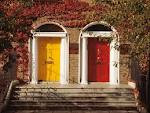
Whilst
I welcome the publication of the Government’s new tourism policy
‘
People, Place and Policy – Growing Tourism to 2025’, I believe it lacks the vision and ambition
required to fully capitalise on the sector's potential for growth over the coming decade and beyond.
With
our key actions focused on overseas marketing, product development and
skills-based training (as per the tourism policy review of 2003), and our
governance model unchanged, I see no evidence of a vision bold and brave enough
to realise the aspiration of participants at the Global Irish Economic Forum
2011, for Ireland to be “the best small country in the world in which to do
tourism”.
The
draft policy statement sets itself the goal of increasing revenue from overseas
visitors, excluding carrier receipts, from €3.3 billion to €5 billion by 2025.
It also aims to increase employment in the sector by 50,000 from the current
estimated levels of 200,000.
When
compared with the targets set out in the tourism policy review of 2003, what
strikes me is just how conservative our aims and ambitions have become. Back
then, our goal was to increase revenue from overseas visitors, excluding
carrier receipts, from €3.2 billion to €6 billion by 2012. Additionally, Fáilte
Ireland estimated that the sector employed 257,000 back in 2007.
Meanwhile,
according to the World Tourism Organisation, international tourism receipts grew
from €513 billion in 2002 to €873 billion in 2013. Over the same period,
revenues from overseas tourism to Ireland have been largely flat - €3.2 billion
in 2002, €3.9 billion in 2007, €2.9 billion in 2011 and €3.3 billion in 2013.
Why are
our hopes and aspirations for the sector now so muted? The global economic recession makes an easy
answer. Looking a little deeper, I
believe that the leadership within the sector has become ever more conservative
and, coupled with the distinct lack of vision evident in the draft policy
statement; we are effectively standing in the way of our own success.
We
only need to take a look at our own agri-food sector for an example of a
positive and ambitious approach to policy development. In its vision of smart,
green, growth, Food Harvest 2020 recognises that ‘the most compelling picture that emerges in the decade ahead is one of
opportunity’.
What
we need now is an ambitious vision for Irish tourism, backed by strong public
and private sector leadership, informed by up to date knowledge and research,
and supported by a cohesive framework within which all the actors pull
together.
The
OECD in its “National Tourism Policy Review of Ireland” (2004) identified that ‘substantive change is required of
Government Policy, in the delivery of that policy by the Tourism State
Agencies, in the work of industry representative bodies and, most importantly,
at the level of individual enterprises throughout the industry’.
In a
nutshell - a change in the governance model of Irish tourism is the ONE policy
action that has the capacity to radically transform the prospects for Irish
tourism.
And, here we are in 2015 with a tourism policy that does nothing to address the very obvious need to improve
the co-ordination of tourism policy - across national and local government,
state agencies and industry. It is clear that the status quo will be
maintained even though it is a major cause of fragmentation in service
provision across the sector.
The
policy makes clear that the provision of future state supports for investment
in tourism shall be evidence based. However, the evidence base in Irish tourism
is extremely weak, as the Report of the Tourism Renewal Group (2009) pointed
out. It highlighted that, as an integral part of the knowledge economy,
competing in the global marketplace, tourism must have a strong knowledge base.
It also emphasised, that to maintain competitiveness, the industry needs product, management
and marketing innovation, supported by a world-class research, education and training
capacity in third‐level institutions. It pointed to
the absence of designated State funding for research in tourism and contrasted
this to an annual research budget for agriculture in excess of €100
million.
Meanwhile, the UNWTO (2013) has forecast that the number of international tourist
arrivals will grow from just over 1 billion in 2012 to 1.8 billion by 2030. It
is in this context that I believe tourism has the potential to become a
‘game-changer’ for Ireland in terms of jobs, foreign earnings and tax revenues.
However,
the new tourism policy is bereft of new ideas, inspiration, and ambition. It
offers us simply more of the same in terms of actions, safe targets, and
conservative thinking. In this
increasingly crowded and competitive marketplace, more of the same will simply
not do.
 Congratulations to the Irish Tourist Industry Confederation (ITIC)
Congratulations to the Irish Tourist Industry Confederation (ITIC)









































































